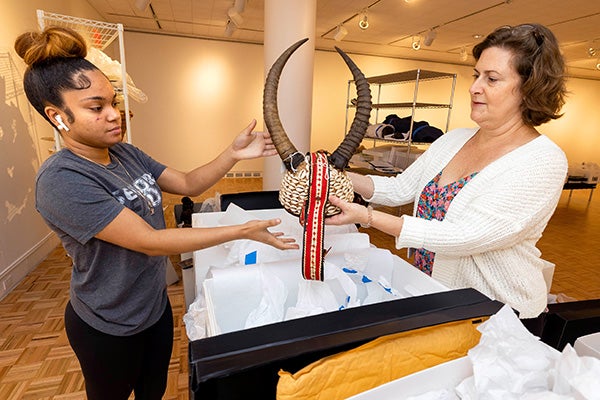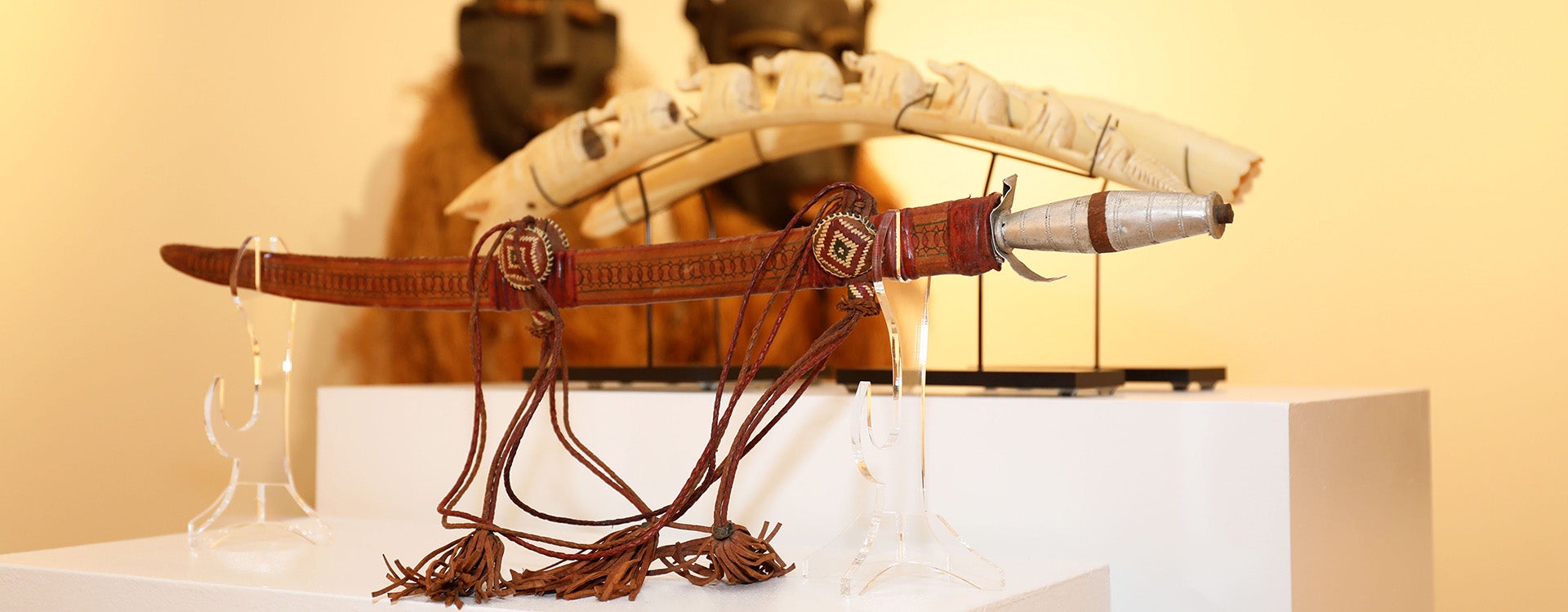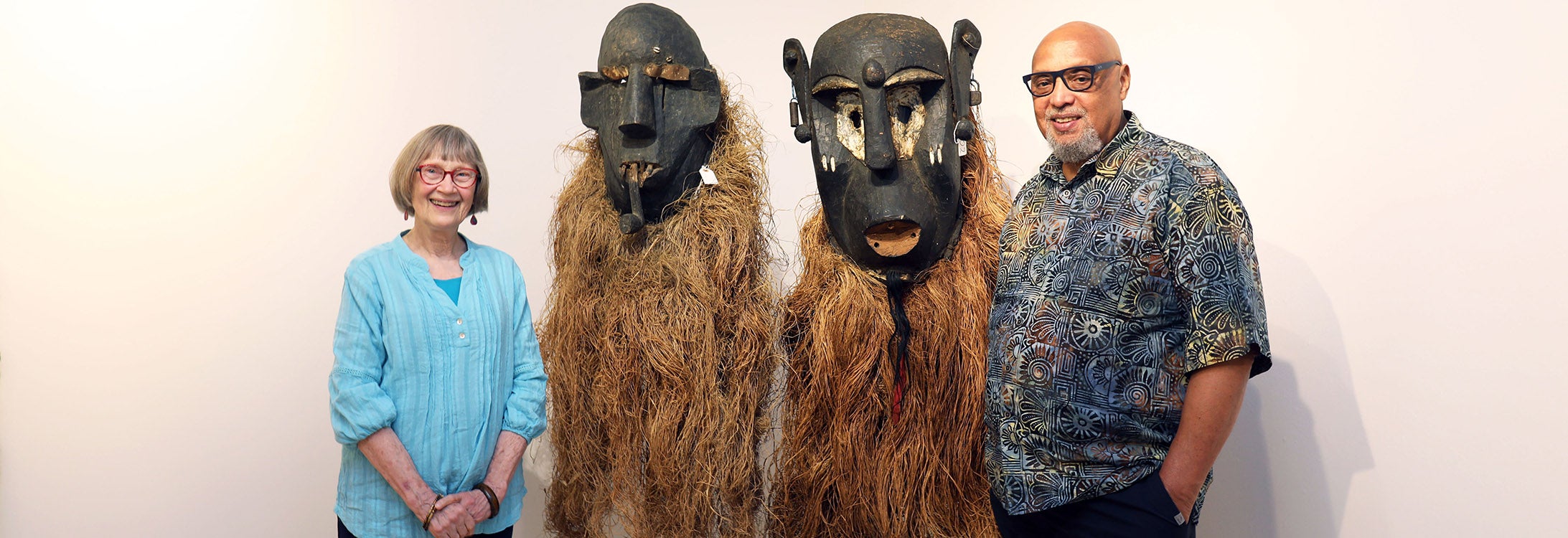AFRICAN ARTWORKS
Traditional, modern African art on display at ECU
About 150 African art pieces incorporating everyday items like hand stamped fabric to one-of-a-kind carved Gongoli masks are on display in a new exhibition in Jenkins Fine Arts Center at East Carolina University.
The artwork has been donated by Celeste and Reginald Hodges of Durham to ECU’s School of Art and Design, adding to the school’s large African art collection. The exhibit, “Selections from the Celeste and Reginald Hodges Collection: African art, from traditional to modern,” will be in the Wellington B. Gray Gallery through Sept. 30.
EXHIBIT INFO
“Selections from the Celeste and Reginald Hodges Collection: African art, from traditional to modern”
- Opening reception — 5-8 p.m. Sept. 1
- Exhibition dates — Aug. 15-Sept. 30 in the Wellington B. Gray Gallery in the Jenkins Fine Arts Center at ECU
The Hodges are former Peace Corps volunteers who — after their assignments ended — built a life and family in West Africa, working for international organizations for two decades. During that time, they collected hundreds of traditional and modern artworks and textiles and took photographs and portraits of village life, before eventually settling in North Carolina.
They have donated hundreds of items to universities and museums in addition to ECU, including Duke, UNC Chapel Hill, NC State, the University of Michigan and the North Carolina Museum of Art.
While several have shown a few pieces at a time, ECU has created an exhibition to display the entire collection at one time. “This is the first time there’s ever been an actual exhibit of our pieces,” Celeste said. “We’re just really honored that ECU has our collection and is doing an exhibit.”
For the art to be exhibited at ECU also has special meaning for Reginald, who grew up on a tobacco and cotton farm in Cumberland County. “This is the first time we’ve had an exhibit in an area that incorporates eastern North Carolina,” he said. Celeste grew up in Chicago, where her father ran a mom-and-pop grocery store before he got a job with Coca-Cola and moved the family to the suburbs.
The Hodges visited ECU’s gallery on Friday while the artwork was being installed. Curator Maria Modlin and Kate Bukoski, director of the School of Art and Design, have worked with the couple for more than a year on the donation and transfer of items in preparation for the exhibition. An opening reception is scheduled 5-8 p.m. on Sept. 1.
“We allowed them to select anything they wanted, and we noticed when they went around, they selected baskets, book markers, a broom — they took authentic art. It was really a mixture that reflected the culture,” Reginald said, adding that some dolls on display were originally made for tourists.

ECU senior Makaila Whitaker and Gray Gallery curator Maria Modlin unpack pieces of African art in 2022 that are now on display at the gallery. (ECU photo by Rhett Butler)
“It is nice the way that you have incorporated the household everyday pieces, which a lot of museums do not want to show, but it shows the culture of the people who made the art,” he said.
Some of the Hodges’ favorite pieces include life-sized 1950s Gongoli masks that were used to make people laugh during sad times, and a wedding blanket that helped protect people against mosquitoes.
“I look at what is in the gallery right now from the collection and there’s something for every single student in our school,” Bukoski said. “There are textiles, there’s print making, there’s silk screen on cloth, there’s wood carving, there’s sculpture, there’s the embroidery, the graphic design with the currency. There’s really something for everyone here.”
The history of the items spans a massive geographic area from Tangier on Morocco’s west coast to Durban along Africa’s southeast coast. Many were shipped to the U.S. before war started. “We had no idea that a war was going to engulf Liberia and Sierra Leone,” said Reginald, who worked for five years to demobilize child soldiers in those countries before heading to Angola. “The war in Angola went on 25 years. There were people there we saw and met who never knew a time when there wasn’t a war.”
Celeste and Reginald decided to apply to the Peace Corps after hearing John F. Kennedy’s speech announcing its creation. They were accepted to the Corps after college and met in the late 1960s while on assignment in rural Sierra Leone, where they were later married. The Hodges relocated to North Carolina in 2000. Reginald worked as director of the Durham Literacy Council and Celeste was a web administrator at Duke University until retirement in 2014 and 2018.
Celeste said it was time to part with the artwork; they recently donated over 550 photographs to Duke. “We can’t hold onto these any longer. We’re in our late 70s and we have to let it go. It’s a dilemma facing so many Peace Corps volunteers that we know. They have items that they treasure, and they want them to go to a good place. We’re just delighted that ECU is taking them.”
The Hodges said they hope the exhibit will help promote a better understanding and appreciation of Africa, which accomplishes one of the Peace Corps three goals to help Americans learn about other people and cultures. “We’re still doing what the Peace Corps (envisioned), and we were volunteers over 50 years ago,” Reginald said. Photos of the items that were donated to ECU along with information about the Hodges can be found on their website.

Some items in the exhibition are an estimated 200 years old. (ECU photo by Kristen Martin).
